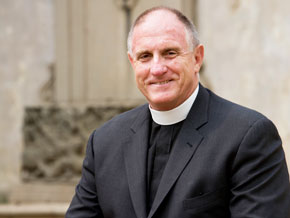Overcome Your Fears: Live in a House of Love

Photo: Cam Sanders/All Saints Church Pasadena
To live in a constant state of anxiousness is hardly living at all. The Rev. Ed Bacon explains why you should face your fears head on and try to spread peace to your community.
One of the biggest concerns of any faith community is the presence of anxiety: living in the House of Fear rather than the House of Love. Religious leaders know that there must be constant vigilance against a faith community being infected with anxiety. That applies to every fear-producing event, including the H1N1 virus . While we have had church members who have had the H1N1 virus and who nondramatically, matter-of-factly chose to stay home, got well and returned to church, we have not had an outbreak of anxiety around the flu. Perhaps it is because we have treated this with nonanxious precaution. I don't think there is a church in the United States that has not thought through the implications of the H1N1 virus for communion. I believe that every community must address every threat to health and life—to be sure. But how we do that can help people learn arguably the most important lesson of all: Move into the future without a fear-based mind-set.
Fear and anxiety are as infectious as a virus and can be much more deadly. Fear is actually an avoidance of living in the present through an obsessive rehashing of the past or a totally unproductive fantasizing about the future. Anxiety is a way of completely missing the sacred nature of the present moment. Just as damaging, chronic fear actually impedes our ability to think. It also siphons our energy away from being devoted to getting well and being whole.
When chronically fearful, we can actually make a case of H1N1 worse or our economic crisis even more personally catastrophic. I have a friend for whom watching a news channel on cable TV became a serious problem. She became aware that the more she watched, the more she became upset. The more she became upset, the less functional she was. So she watched one 30-minute cycle of news and then weaned herself from watching again until the next day. Another friend told me that when he notices that he has become unhealthily afraid, he calls or writes another friend whom he can always count on to be calm; that, in turn, dials down the frequency level of his own fear.
Whatever one chooses to do, it is essential for each of us to know how destructive anxiety can be in our lives and learn how to be aware of the toll it takes on our health, thinking and functionality. Then we must find a way to decrease our own fear level so that we can do our part to calm down our own fear-based environments, families, wider relational networks—even our world.
The Rev. Ed Bacon is a guest host for the Oprah's Soul Series radio show. He is also the rector of All Saints Episcopal Church in Pasadena, California.
More Ways to Fight Your Anxiety






